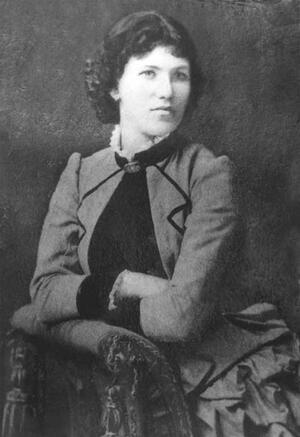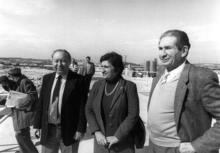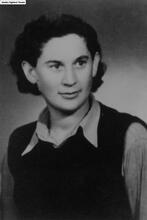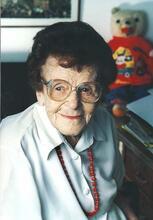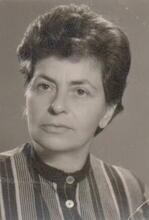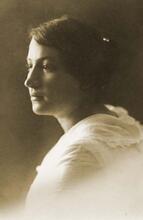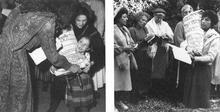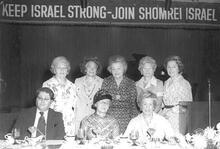Lea Hurvitz
Raised in a Zionist family in Minsk, Hurvitz joined the egalitarian Bilu pioneer movement as a teen. After meeting her husband Zvi in 1882, she spent several years tutoring children then moved with Zvi to Palestine. The couple settled in Gedarah, where they worked on a settlement. Despite harsh conditions, Hurvitz welcomed new immigrants, raised seven children and helped her parents and siblings resettle in Palestine themselves. In 1943 the newspaper Ha-Boker published parts of her memoir, which discussed the women of the First Aliyah who were largely ignored by historians documenting the period. Hurwitz recounted their labor and the hardships they faced alongside the male pioneers. Without their willingness to make homes and raise children, Hurwitz wrote, the settlement effort would have been doomed.
Lea Hurvitz was an idealistic and determined woman whose actions conformed to the ideals of the First Lit. "ascent." A "calling up" to the Torah during its reading in the synagogue.Aliyah (1882–1903), as she took upon herself to live in hardship and deprivation in the early days of Gederah.
Early Life and Zionist Upbringing
She was born in Minsk, Belarus, in 1867. Her father, Yehoshua-Dov Beninson (1846–1931), an accountant in a commercial bank, was one of the first members of the Lit. "love of Zion." Movement whose aim was national renaissance of Jews and their return to Erez Israel. Began in Russia in 1882 in response to the pogroms of the previous year. Led to the formation of Bilu, the first modern aliyah movement.Hibbat Zion movement and dedicated himself to its cause. Her mother, Yehudit Levin, was the daughter of a rabbi. Lea had two sisters, Bella (1886–1962?) and Ruhama (1889–?), and three brothers.
Her parents’ house was a Zionist center. In the memoirs she wrote in 1936 Lea describes in detail her childhood in a Zionist home, referring frequently to her father’s public appearances and to the speeches, full of enthusiasm and emotion, which led many to join Hibbat Zion. His influence on Lea was a main factor in her decision to realize her ideals in Palestine.
Lea decided to join the Bilu movement, which was founded in 1882. (Bilu is a Hebrew acronym of Isaiah 2:5: Beit Ya’akov, lekhu v’nelkhah). She felt totally at one with this group of pioneers, who, in direct contrast to the norm of the time, accepted women as equal partners.
She studied at a secondary school for girls in Minsk, graduated at the age of fifteen and obtained a license to serve as a tutor in private homes.
Making Aliyah
Lea met her husband, Zvi Hurvitz, at her parents’ home. Zvi emigrated to Palestine in 1882, returning four years later from Gederah, the Lit. "village." The dominant pioneer settlement type of the Jews in Palestine between 1882moshavah founded by the Biluim in 1884, to marry Lea at her family’s home in Russia in 1886. Immediately after the wedding the couple left for Palestine.
In her memoirs, Lea expressed in poetic language the enormous excitement she felt on first seeing Palestine’s landscape. She described how she climbed Gederah’s hill and, on reaching the top, quoted the poem by Pushkin on the founding of St. Petersburg: “Here a city will rise despite our neighbors’ arrogance!”
After spending some time in the home of one of her relatives in Rishon le-Zion, Lea moved to Gederah, where she spent the rest of her life and endured the unbearably difficult conditions common to women of the first Aliyah.
Lea and Zvi had seven children: Ya’akov, who died as a child, Amnon (1886–1965), Avinoam (1891–1970), Adinah (1893–1949), Yemimah (1899–1967), Shoshanah (1903–1997) and Amiel (1908–1965). Throughout this period, despite taking care of her family and enduring hardship, she found the time to encourage new immigrants and host Hibbat Zion members who came to inspect the settlements.
Lea’s parents and her sisters moved to Rishon le-Zion in 1906. Bella and Ruhama married two brothers who had been born in Palestine. Two of Lea’s brothers, Hayyim-Yizhak and Emmanuel, studied agronomy at Mikveh Israel. Hayyim-Yizhak went on an ICA (Jewish Colonization Association) mission to Argentina. Emmanuel became a colonel in the Argentine army. Gershon, the third brother, studied in France and died there.
Honoring Women Pioneers
The last part of Lea Hurvitz’s memoirs relates exclusively to Gederah’s women, indicating the subject’s great importance in her eyes. She describes in detail the women settlers’ daily hardships and their active and significant role in times of crisis: “Without these women, the men would not have been able to build all that they did. The women suffered dire want in equal measure; they raised their children in great suffering. … The women worked at home and helped in the field as much as possible. … They performed all the household chores by themselves, without any help. … I never heard complaints about their hard lives. Not one wanted to return home. Here we built up our motherland, dear to everyone. … Many women stood under fire beside the men, collected stones that they gave the men. … The spirits of these heroic women never failed, and they even encouraged their husbands.” Thus, so many years after the fact, Lea tried to repair the damaged image of women pioneers.
A short essay about her, “Leike,” by Moshe Smilanski appeared in Bustenai in 1934. In 1929, she published an essay in Ha’aretz about the pogrom in Be’er Toviyyah. In 1943, Ha-Boker published parts of her memoirs describing her first days in Palestine.
Lea Hurvitz died in Gederah in 1958, aged 91.
Smilanski, Moshe. “Leike” (Hebrew). Bustenai 5 (1934).

